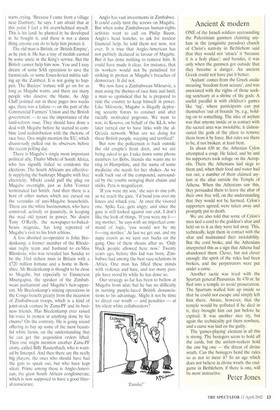Ancient & modern
ONE of the Israeli soldiers surrounding the Palestinian gunmen claiming asylum in the (exquisite paradox) church of Christ's nativity in Bethlehem said that they would not 'attack' it 'because it is a holy place'; and besides, it was only when the gunmen got outside that they became a danger. An ancient Greek could not have put it better.
'Asylum' comes from the Greek asulia meaning 'freedom from seizure', and was associated with the rights of those seeking sanctuary at a shrine of the gods. A useful parallel is with children's games like 'tag', where participants can put themselves 'out of bounds' by, e.g., holding on to something. The idea of asylum was that anyone inside or in contact with the sacred area was inviolable; it dishonoured the gods of the place to remove them from it by force. But rules are there to be, if not broken, at least bent.
In about 630 BC the Athenian Cylon attempted a coup. He failed, and he and his supporters took refuge on the Acropolis, There the Athenians laid siege to them and, when their food and water had run out, a number of them claimed asylum at the altar outside the Temple of Athena. When the Athenians saw this, they persuaded them to leave the altar of their own free will, on the understanding that they would not be harmed, Cylon's supporters agreed, were taken away and promptly put to death.
We are also told that some of Cylon's men tied a cord to the goddess's altar and held on to it as they were led away. This, technically, kept them in contact with the altar and maintained their inviolability. But the cord broke, and the Athenians interpreted this as a sign that Athena had abandoned them. Clever, but not clever enough: the spirit of the rules had been broken, and the perpetrators were put under a curse.
Another tactic was tried with the Spartan general Pausanias. In 470 BC he fled into a temple to avoid prosecution. The Spartans walled him up inside so that he could not escape and simply left him there, Aware, however, that the temple would be polluted if he died in it, they brought him out just before he expired. It was another nice try, but again the technicality got them nowhere, and a curse was laid on the guilty.
The `games-playing' element in all this is strong. The besiegers seem to hold all the cards, but the asylum-seekers hold the one big one — the threat of divine wrath. Can the besiegers bend the rules so as not to incur it? In an age which does not believe in divine wrath, the endgame in Bethlehem, if there is one, will
be most instructive. Peter Jones


















































































 Previous page
Previous page